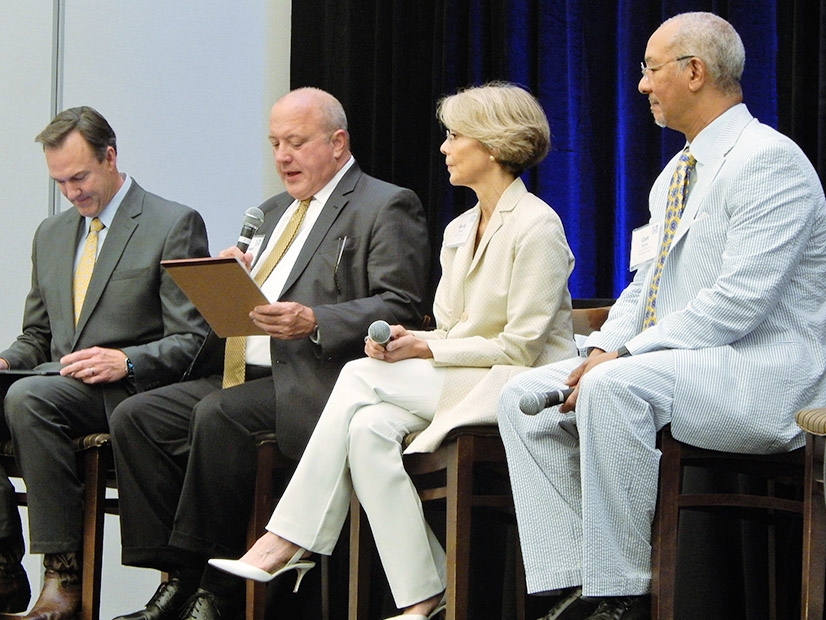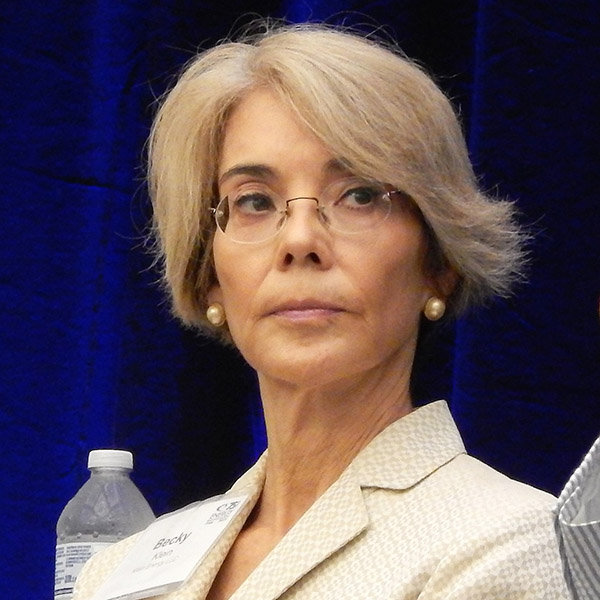
AUSTIN, Texas — Peter Cramton, ERCOT board member for more than five years and board vice chair for 15 days, spoke wistfully of his tenure, which ended shortly after Winter Storm Uri brought the grid to its knees.
“I still believe ERCOT is the best market in the world,” he said earlier this month during a symposium on Texas’ energy system sponsored by the Energy Bar Association (EBA) and the University of Texas School of Law.
“The mission was so clear. We delivered reliable energy at the least cost,” he said. “We embraced that. Then, you can let the engineers, the market designers, the stakeholders jump in and all work together and solve this very technical problem. It works beautifully, most of the time, until it doesn’t.”
It didn’t in February. Uri’s ice accumulation and below-freezing temperatures rendered about half of ERCOT’s thermal generation useless as demand, fueled by poorly insulated homes, spiked to record levels. Millions of Texans went without power and hundreds died during the days of misery that followed.
Fingers were quickly pointed at the lack of dependable renewable energy and ERCOT’s leadership, especially the out-of-state board members who hailed from cold-weather locales such as Illinois, Maine, Michigan and Canada.

One of the Texas legislature’s many bills addressing the winter storm’s aftermath blew up the board structure. The five unaffiliated directors and eight directors elected by their market segments will be replaced by eight political appointees. All Texans, of course.
The board’s political makeup, unlike most other regional grid operators, has left stakeholders unnerved. CAISO’s board members are appointed by the California governor and approved by the state Senate, a result of the 2000-2001 energy crisis.
“Politics and electricity don’t mix very well. Electricity is very technical. Physics wins. As a result, it puts politics in an uncomfortable position,” Cramton said.
“There was tremendous value with the prior structure, which emphasized independent expertise … I don’t think it makes sense to have the ERCOT board be all political appointees,” he said. “What the legislature and the governor should do is set broad principles and explain what they want to accomplish, and delegate that authority to the regulators. The [Public Utility Commission] then delegates the important operational authority to ERCOT.”
Becky Armendariz Klein, a principal with Klein Energy and a former PUC chair and ERCOT board member, agreed with Cramton. She reminded her audience that she had joined with other former Texas commissioners to recommend the ISO’s board be made up of independent directors who go through a search process, “like a corporate board.” (See Former PUC Commissioners Weigh in on ERCOT Fixes.)
“That really takes some of the politics out of it and brings some objectivity [to the process],” Armendariz
Klein said. “We felt as a group that independent board directors at ERCOT are really important, so maybe one day, that will change.”
‘Kind of a Pickle’
Armendariz
Klein and Cramton were among the speakers discussing lessons learned from the winter storm and next steps to be taken during the July 15 summit. Except for those who spent the spring lobbying and testifying before the legislatures, it was the first in-person meeting since March 2020.
EBA President Mosby Perrow was so thrilled to be back among fellow human beings that he donned the last suit he wore one year, four months and seven days ago. But who’s counting?
“We’re back, which feels very good,” a tieless Perrow said. “We thought the EBA summit was a perfect vehicle to have a non-partisan, vigorous debate about what should happen to prevent another blackout.”
Rick Smead, managing director of advisory services for RBN Energy, was the natural gas industry’s lone representative. Addressing the loss of fuel supplies that hamstrung ERCOT’s response, he was duly apologetic, calling the lack of deliverability “the catalyst of everything that happened.”
“It doesn’t feel good. We left it on the shelf like a Soviet grocer,” Smead said. “It was the loss of power to producers that made it such a prolonged and deep outage, so somehow, the producers have to have a different design. The weather simply went … beyond their designs.”
Much of the discussion focused on the uncertain future. The PUC, ERCOT staff and its stakeholders are just beginning to dirty their hands in redesigning the ERCOT market’s focus on affordability over reliability. PUC Chair Peter Lake has called the energy-only market’s emphasis on scarcity pricing, designed to incent new generation, a “crisis model,” while ERCOT Interim CEO Brad Jones is stressing reliability over affordability.
Gov. Greg Abbott, meanwhile, has directed the PUC — whose three members he has appointed over the last three months — to streamline incentives for thermal resources and allocate reliability costs to resources that can’t guarantee availability, such as renewables. (See PUC Debates Answers to ERCOT’s Reliability Issues.)
Will the new market create new winners and losers? That’s likely, but no one is making predictions right now.
“ERCOT is in a state where it wants to perform incredibly conservatively. What that means is price suppression, and price is the way we incent new investment and resources,” said Amanda Frazier, Vistra’s senior vice president of regulatory policy. “[The governor] wants more dispatchable generation. The way the market is designed, which we’ve always thought was correct, was that prices and revenue streams will create the investment that we need. A lot of that investment has been through the development of renewable resources.”

Klein, Klein Energy | © RTO Insider LLC
Armendariz
Klein said she is sensing concern in the investment community, which she said is in “kind of a pickle.”
“On the one hand, they’re attracted to the Texas market because of its historically low wholesale prices,” she said, noting ERCOT’s bounty of renewable resources is important to them.
“Especially now where there’s a lot of impetus for them to report out on environmental activities. Their shareholders are asking for that too,” Armendariz
Klein said. “Going forward, we’re going to have pricing in the market that’s more expensive. That’s just expected. Texas will have higher wholesale prices, but who knows what happens to the renewable portfolio. I think in time, that mix is going to change.”
Energy consultant Alison Silverstein put in a plug for the report she drafted for Armendariz
Klein and four other PUC commissioners. The report, “Never Again: How to Prevent Another Major Texas Electricity Failure,” lists 22 recommendations to improve the ERCOT grid.
Several of the measures call for strengthening housing efficiency, including retrofits for low-income and multifamily housing across Texas. More than half of the state’s homes were built before building energy codes with insulation requirements were adopted in 2001, the report says, and more than 60% of Texas homes are heated with electricity instead of gas.
“Most of [the recommendations] are nowhere near the governor’s and legislature’s immediate priority list,” Silverstein said. “That’s unfortunate because most of the measures have low costs. Those things don’t have the same headline glamour as pounding your fist on the table and demanding to build more power plants.”



